
In March 1950, Australia’s external affairs minister Percy Spender set out the Menzies government’s appreciation of the international situation in a parliamentary speech. The aims of Australian foreign policy, he declared, ‘are essentially the preservation of peace and our way of life’ and its practice is ‘to accomplish its aims in a peaceful manner’.
It was Spender’s prioritisation of peace that lends his words the quality of statesmanship. Spender rightly saw that foreign policy ‘must be principally and continually concerned with the protection of this country from aggression, and with the maintenance of our security and our way of life’.
He was no appeaser, believing ‘the democracies must accept the fact that any policy of appeasement is completely ineffective and even dangerous’. In his previous capacity as minister for the army between 1940 and 1941, he anticipated the Pacific War and urged the return of Australian troops from the Middle East. When Menzies withdrew his United Australia Party from the bipartisan Advisory War Council in 1944, Spender refused to resign—an action that led to his expulsion from the party.
At the same time, he was no militarist. While he recognised pragmatically that foreign policy must be ‘closely integrated with that of defence’, he also acknowledged that there were two instruments of foreign policy—‘one primarily economic, the other primarily military’. The ‘military strength of a nation’, he said, ‘may largely condition the means employed by foreign policy in seeking to achieve its purpose’. That is, small powers must rely less on military force. And if or when foreign policy proves ineffective in protecting against aggression, ‘the departments of war must take over’.
Australian policymakers of the time would have assessed the international situation as being at least as perilous as today’s. In the six months leading up to Spender’s speech, the USSR had tested a nuclear device and Mao Zedong had declared the founding of the People’s Republic of China. The fault lines of the Cold War were hardening in Europe and gelling in Asia. Across the globe, and particularly in Southeast Asia, the fragile post-colonial states were engaged in a struggle for independence.
Far from a sympathiser with communism, Spender laid the blame for prevailing global tensions unambiguously at the feet of Moscow’s expansionist and hostile foreign policy. He spoke of the ‘false ideological attraction which communism excites’ and foresaw that the emergence of communist China ‘fundamentally changed the whole picture in Asia’.
To Spender’s mind, however, differences in political systems were not a sufficient cause for war. He said, ‘I hope that I have not drawn too depressing a picture of the possible consequences of the Communist victory in China.’ Yet he held that ‘there is no logical reason why democracy and communism, as distinct from Communist imperialism, should not be able to live together in the world’.
It was Spender’s wisdom that diplomacy and economic cooperation should precede military action, and that maintaining peace was more crucial to the security of the nation and its people than winning costly and destructive wars. Spender was no Pollyanna. The Colombo Plan was diplomacy and economic policy in the service of national security, not altruism, and his enthusiasm for the ANZUS treaty was grounded in a realistic understanding of power.
That he placed the preservation of peace at the top of Australia’s strategic objectives was understandable. He was of the generation that had experienced the slaughter of World War I and the horror and devastation of World War II. It seemed sensible and obvious to him that aggression tied to expansionist policies was the real danger to Australia.
However, strategic policy formulation should always be informed primarily by an awareness of how wars start. Nothing else has the same potential to adversely affect the security of a nation. War, not skirmishes or interventions, is a discontinuity that potentially will have a transformative, even catastrophic, impact, both externally and domestically.
And while the minutia of past wars might fascinate historians, strategic policymakers might usefully look to broad shifts in global politics and power relativities, the emergence of new political ideologies, and upheavals in relationships or shifts in international norms. For Spender, these would be arguments for greater energy, innovation and purpose in foreign economic policy and diplomacy, accompanied by prudent and proportionate, but not provocative, military preparations.
The aftermath of each of the 20th century’s world wars was marked not by increased security, but by growing instability, crises and confrontation. Moreover, the former way of life, norms and values of many states disappeared post-war and their geopolitical situations degraded.
The political and economic upheaval of World War I led to the collapse of the imperial states in Europe and the emergence of bolshevism and dictatorships. After 1945, Europe was divided, China became communist, former colonial possessions became states, and the rivalry between the Soviet Union and the US transformed global politics. The next major war cannot be expected to produce less unpredictable or dangerous disruptions.
As Spender declared, ‘The experience of two world wars has shown that authority which depends on force alone rests upon hollow foundations if it is not sustained by honesty of purpose, and a recognition of the value of individual human beings.’ But he knew that as a last resort a nation may have to fall back on war. He also knew that only in peace and not in war can a nation’s way of life be guaranteed. He knew that pursuing peace pragmatically and assiduously was the best form of security.
Confronted by the strategic circumstances prevailing today in the Asia–Pacific region and further afield, Spender’s response would not be to prioritise the military posturing that could bring about a ruinous war. He would have reiterated that the greatest effort should be put into avoiding a war that would result in the deaths of large numbers of Australians and bring economic ruin. There would be no Australian ‘way of life’ to preserve after that.

